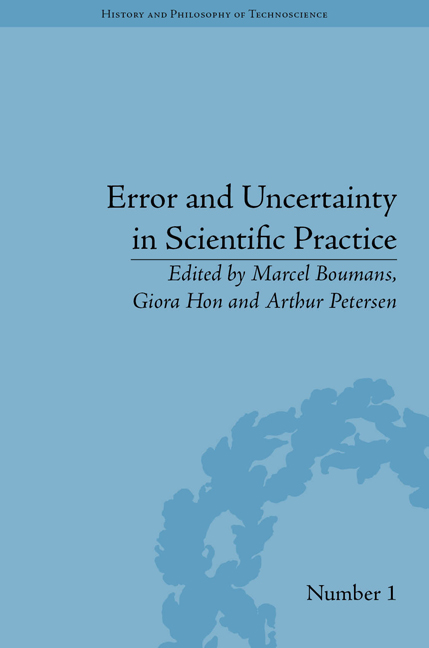Book contents
- Frontmatter
- Contents
- Acknowledgements
- List of Contributors
- List of Figures and Tables
- Introduction
- 1 The Lack of a Satisfactory Conceptualization of the Notion of Error in the Historiography of Science: Two Main Approaches and Shortcomings
- 2 Experimental Knowledge in the Face of Theoretical Error
- 3 Learning from Error: How Experiment Gets a Life (of its Own)
- 4 Modelling Measurement: Error and Uncertainty
- 5 Handling Uncertainty in Environmental Models at the Science–Policy–Society Interfaces
- 6 Variations on Reliability: Connecting Climate Predictions to Climate Policy
- 7 Order and Indeterminism: An Info-Gap Perspective
- 8 Learning from Data: The Role of Error in Statistical Modelling and Inference
- Notes
- Index
1 - The Lack of a Satisfactory Conceptualization of the Notion of Error in the Historiography of Science: Two Main Approaches and Shortcomings
- Frontmatter
- Contents
- Acknowledgements
- List of Contributors
- List of Figures and Tables
- Introduction
- 1 The Lack of a Satisfactory Conceptualization of the Notion of Error in the Historiography of Science: Two Main Approaches and Shortcomings
- 2 Experimental Knowledge in the Face of Theoretical Error
- 3 Learning from Error: How Experiment Gets a Life (of its Own)
- 4 Modelling Measurement: Error and Uncertainty
- 5 Handling Uncertainty in Environmental Models at the Science–Policy–Society Interfaces
- 6 Variations on Reliability: Connecting Climate Predictions to Climate Policy
- 7 Order and Indeterminism: An Info-Gap Perspective
- 8 Learning from Data: The Role of Error in Statistical Modelling and Inference
- Notes
- Index
Summary
Introduction
One would expect that the concept of error figures large in the historiography of science. After all, history is studied because the past differed from the present. With respect to the history of science it is natural to suggest that such differences come about in differences between right and wrong. What else would be the incentive to change our theories about the world if these are never found to stand in need of correction? This insight is not new to historians but the strange thing is that it has not led to a satisfactory theory of error. As a matter of fact, talk of error in the traditional epistemic way has almost completely faded into the background in present-day historiography. This chapter aims to clarify this situation.
In the chapter two basic outlooks on the phenomenon of error will be discerned. The first I have named the ‘errors as obstacles’ approach. In this approach, errors are conceptualized as obstacles to progress and science is seen as a process in which errors are sifted out. This happens mainly through the application of rational procedures such as the use of scientific methods, principles of reasoning and so forth. From the second perspective, errors are basically seen as products of negotiation. I will refer to this group as the ‘error as failures’ approach.
- Type
- Chapter
- Information
- Error and Uncertainty in Scientific Practice , pp. 13 - 38Publisher: Pickering & ChattoFirst published in: 2014

